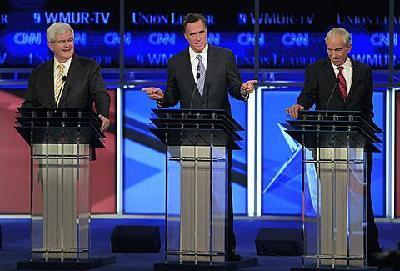Following their first major presidential debate, Republican White House contenders have made it clear they intend to make the 2012 US presidential election a referendum on President Barack Obama's handling of the domestic economy. Political analysts say the strategy is no surprise and could make for a very close election next year.

Seven Republican contenders took part in the presidential debate, and political analysts generally gave the higher grades to former Massachusetts governor Mitt Romney and Minnesota Congresswoman Michele Bachmann.
Romney has solidified his lead in the polls as the Republican frontrunner in recent weeks and is citing his business background as an advantage in discussing how to revive the US economy.
"The right way for America to create jobs is to keep government in its place and to allow the private sector and the energy and passion of the American people to create a brighter future for our kids and for ourselves," said Romney.
Despite his lead in the polls, Romney still faces concerns from conservatives who question his previous moderate stances on issues like abortion, climate change and health care reform.
Michele Bachmann officially joined the presidential race during Monday's debate and experts said she made a strong initial impression even though less well known than Romney nationally.
Bachmann has appeal to two important groups within the Republican Party-Evangelical Christians and supporters of the Tea Party movement pushing for smaller government and a repeal of President Obama's health care law.
"As president of the United States I will not rest until I repeal 'Obamacare.' It is a promise. Take it to the bank. Cash the check. I will make sure that that happens," said Bachmann.
Five other contenders took part in the debate including former Minnesota governor Tim Pawlenty, former US House speaker Newt Gingrich, former Pennsylvania senator Rick Santorum, Texas Congressman Ron Paul and Georgia businessman Herman Cain.
The Republican contenders focused their rhetorical fire on President Obama and not each other, at least for now, signaling they intend to make Obama's handling of the economy the central issue in next year's campaign.
Recent polls indicate President Obama's approval ratings have slipped slightly after surging last month in the wake of the killing of al-Qaida leader Osama bin Laden.
Political analysts say bad economic news is to blame, especially the recent tick up in the jobless rate to 9.1 percent.
John Fortier is with the Bipartisan Policy Center in Washington:
"But if there is not much change in direction, four years of bad economic times, even if it started under [former President] George Bush, is a bad sign for the president," said Fortier.
Fortier spoke on VOA's Encounter program, as did political analyst Stuart Rothenberg.
"I think we are headed for a real race. I am assuming that the economy that we see today is going to be something like the economy we see in the summer and fall of 2012," noted Rothenberg.
The latest polls show only Mitt Romney comes close to defeating President Obama if the election were held today. But all of that could change in the months to come, says Quinnipiac University pollster Peter Brown.
"We do not know what the playing field will be like in the fall of 2012," noted Brown. "Tell me what the price of a gallon of gasoline is. Tell me what the unemployment rate is. Is the United States embroiled in foreign conflicts that the electorate is unhappy about? Those are all unknowns right now that you just can not know."
Former Utah governor Jon Huntsman is expected to join the presidential field next week and former Alaska governor Sarah Palin is still considering joining the race as well.
奧巴馬公開(kāi)出生證明 回應(yīng)競(jìng)選資格質(zhì)疑
US hiring slows, unemployment rate hits 9.1
(來(lái)源:VOA 編輯:崔旭燕)
